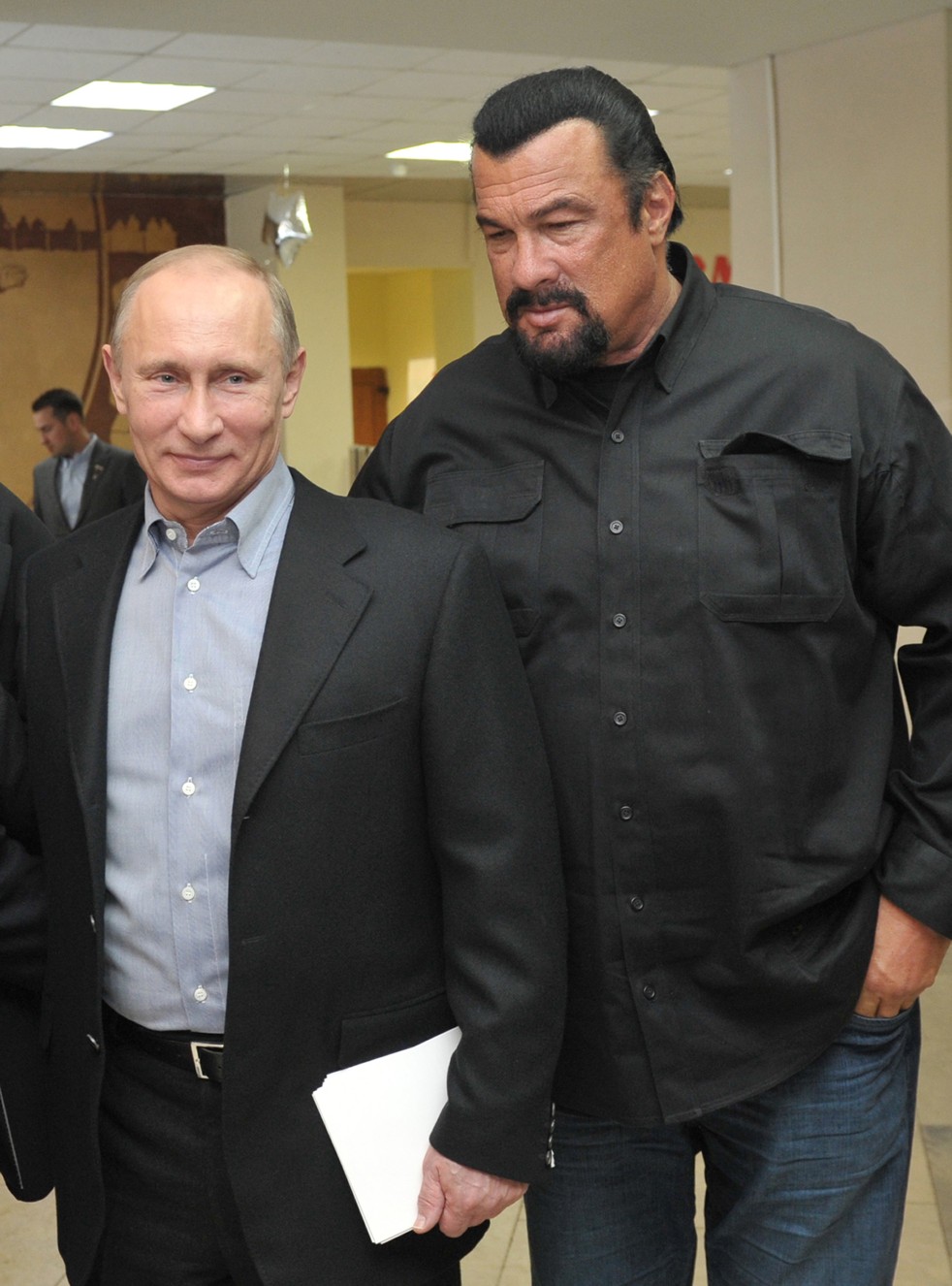Action film star, orientalist, martial arts expert, and recognized Tibetan Buddhist tulku Steven Seagal reemerged in the media this week after aiding a congressional delegation to Russia. Seagal has long been well connected in Russia, where he’s known to get all buddy-buddy with President Vladimir Putin, an avid martial arts enthusiast. Last year the two, between roundhouse kicks, endorsed Stalin-era physical fitness training programs.

The travelling-circus of a congressional delegation—headed by California Republican Rep. Dana Rohrbacher, with Rep. Michele Bachmann in tow—enlisted the help of Seagal to secure meetings with Russian law enforcement in order to discuss the Boston Marathon bombing, and likely to provide an impregnable one-man security force.
Seagal at one point separated with the group to visit Chechnya—a move far too ballsy for the elected representatives he accompanied—where he visited the palace of Head of Chechen Republic Ramzan Kadyrov, who has been personally implicated in egregious human rights abuses including torture, kidnap, and murder, and is said to keep a 300-name “Murder List.”
“All these accusations are thrown around,” said Seagal, who was given a lavish welcome in Kadyrov’s palace. “Is there any evidence? Had he been indicted?”

Rep. Rohrbacher, setting the premise for another terrible action flick starring Seagal, remarked, “If you are in the middle of an insurrection with Chechnya, and hundreds of people are being killed and there are terrorist actions taking place and kids are being blown up in schools, yeah, guess what, there are people who overstep the bounds of legality.” Sadly, like Seagal’s plan to train a “volunteer posse” to patrol local schools armed with automatic weapons, this is real.
Never one to miss an opportunity for gratuitous violence, Seagal futher deepened his Russian ties when he became the potential face of V.A.Degyarev Plant, one of the largest gun manufacturers in the country. Appearing with Seagal in front of plant workers, Russian Deputy Prime Minister Dmitry Rogozin announced, “You’re ready to fight American (manufacturers) with your teeth and your intellect, and if Americans are prepared to promote and support you, that says we’re learning new ways to work on corporate warfare markets.”
We might at least conclude, from all of this, that the tulku system is deeply flawed.
*
The demographic of self-immolators in Tibet is beginning to change. Once a practice exclusive to devout, dissident monastics, the movement has seen a rise in young women—including mothers. On March 24, Kalkyi, mother of four, travelled to a monastery in the township of Barma, where she doused herself with gasoline, lit a match, and set herself aflame, becoming the ninth mother to set herself on fire in just over a year.
Kalkyi’s self-immolation marks the 39th in Ngaba prefecture, which has become a hotbed for the deadly suicide practice in protest of Chinese policy and rule. Experts attribute the geographical pattern of self-immolations in the prefecture to the 2012 shooting of a 20-year-old student named Urgyen in the Barma region. Chinese security forces killed the student when they fired on him and other protesters who were attempting to prevent the arrest of a young activist.
Director of Columbia University’s Modern Tibet Studies Program Robert Barnett offers one explanation for the rise of lay women self-immolators: “Many people see themselves as socially insignificant, particularly younger women, so it seems to them more reasonable that they should sacrifice themselves for the honor of the community as a whole—as the community leaders, the monks, had already done.”
*
In happier news, we are pleased to announce that Utne Reader has awarded Tricycle the 2013 award for “Best Body/Spirit Coverage,” citing “great writing and presentation—but most important was a noted willingness to surprise, even challenge, readers.” We thank Utne for the honor, and our contributors, and, most importantly, our wonderful readers, for being willing to be challenged.
Since its founding in 1991, Tricycle has become a beacon for Western Buddhists, attracting a variety of other spiritual seekers along the way. In the past year, the pages of Tricycle have considered serious topics from addiction to aging, challenged widely accepted notions of the historical Buddha, and recounted spiritual quests that have not led to Buddhism. This openness to difficulty and uncertainty suggests a living-out of the words the magazine puts to print.
We congratulate our fellow winners YES! Magazine, The New Inquiry, Tom Dispatch, Colossal, Guernica, New Internationalist, and Scientific American!
Thank you for subscribing to Tricycle! As a nonprofit, we depend on readers like you to keep Buddhist teachings and practices widely available.